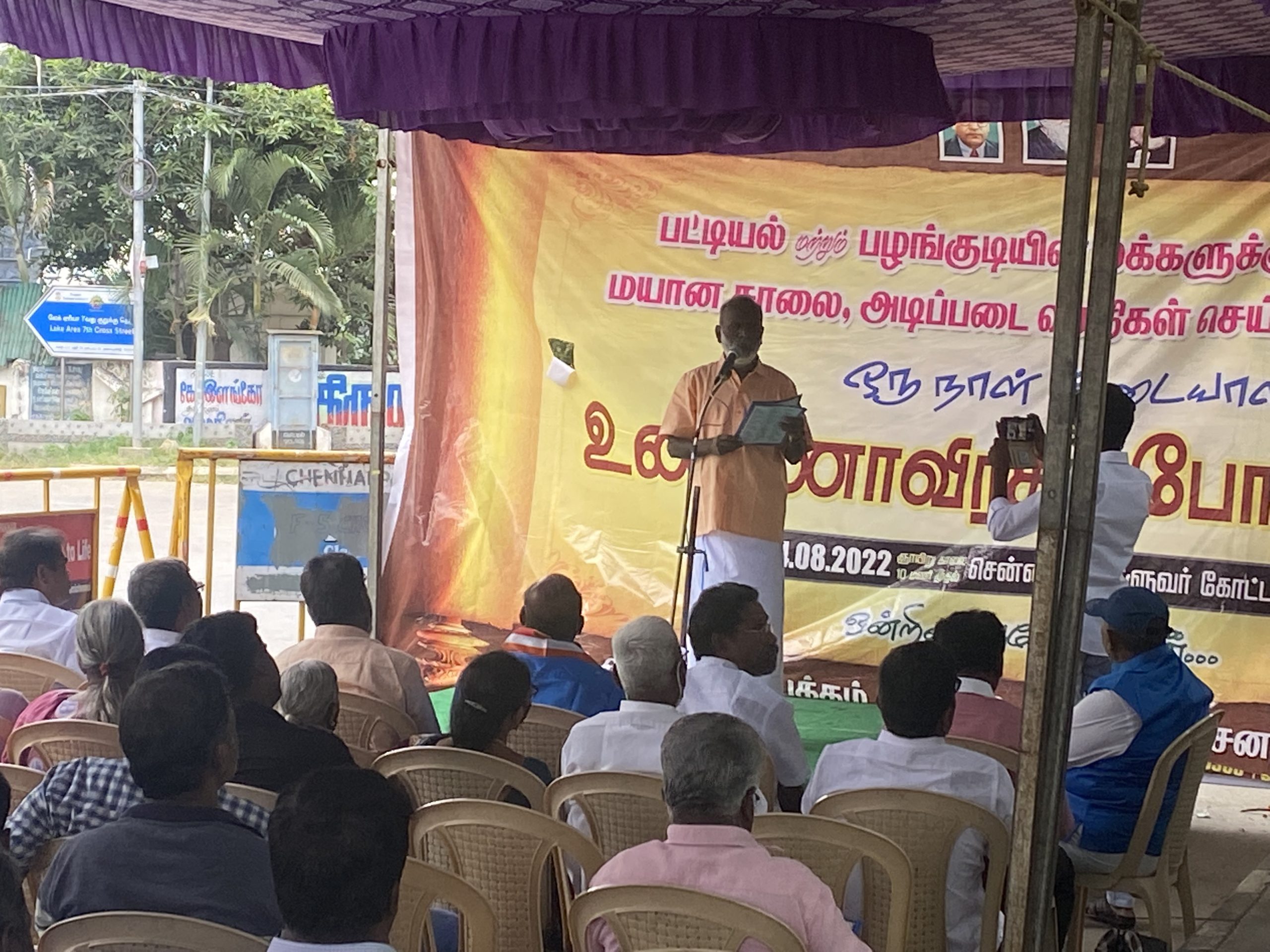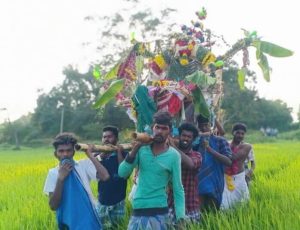Dalits in Tamil Nadu have been battling for more than 60 years for burial grounds and roads to burial grounds, as they don't have one or don't have access to it.

Dalits in Tamil Nadu, for more than 60 years, have been battling for burial grounds and roads to burial grounds, as they don't have one or don't have access to it. (Umar Sharieef/South First)
A day before India celebrated its 75th year of Independence, Dalits of Tamil Nadu went on a day-long hunger strike demanding something usually due as a birthright: a place to bury their dead.
Dalits in the state have for long found themselves being denied land for proper burial grounds. In most districts, they simply bury their dead on riverbeds.
But these days, even that “privilege” does not come easy, said Karuppiah, one of the protestors gathered at Valluvar Kottam, a memorial site for Tamil poet and philosopher Thiruvalluvar, in Chennai.
For instance, in a shocking 2019 incident, he told South First, Dalit mourners were compelled to lower the body of a dead person from a bridge with a rope because an upper-caste community refused them passage through their land.
“Dalits are being oppressed no matter which party is in power,” said Karuppiah, general secretary of the Dalit Liberation Movement, an initiative that seeks to uplift the condition of the community.
“We are fighting for our land, for our housing, and now, for our burial grounds,” he bitterly quipped.
Dead body of a Dalit man had to be lowered from a bridge as people belonging to upper caste community allegedly denied permission to take out his funeral procession through their agricultural lands in Vellore.
This is the sad reality of 21st century India! pic.twitter.com/YeQUJakxFj
— Shilpa (@Shilpa1308) August 22, 2019
What is most galling for Tamil Nadu’s Dalits is that there is land earmarked for them, but it exists only on paper. In 1892, the then British rulers had specially allotted this land for their use.
This land is widely referred to as “Panchami land”, the name coming from the word “Panchamar”, the local term for the present-day Dalit in Tamil Nadu.
In theory, Panchami land cannot be sold or re-classified. But it is getting usurped instead — by real estate developers.
Today, as per Karuppiah’s estimates, Dalits own less than 10 percent of the estimated 1.2 million acres in their names.
“Let alone burial grounds, we don’t even have land deeds for housing,” said Karuppiah.
So acute is the problem that Dalits are often forced to cremate their dead — a practice they reserve only for those who commit suicide; these days, it is not uncommon for them to overlook such distinction.
“We have been forced to break away from tradition,” Selvaraj, a Dalit from Salem, told South First.

People from the Adi Dravidar community, a sub-sect of Dalits in Tamil Nadu, carry their dead through the agricultural land in Sennagarampatti in the Madurai district on 22 December, 2020, as the dominant Hindus did not let them enter their burial ground from the village side. (Supplied)
One major factor that contributes to their problems is the indifference shown by lower-level officials to their plight, irrespective of what policies are formulated for their benefit.
Latha, an Irular — a Scheduled Tribe group — recalled a 2015 incident from her village in Chengalpattu district that exemplifies this.
“When one of our community members died, we approached our VAO for help, but this man told us to throw the body in the river,” she said.
Typically, one duty of the VAO, or the Village Administrative Officer, is maintaining the lease register for government lands; if anyone could help the Irulars find a burial plot, it would be the VAO.
Latha said the VAO’s curt dismissal incensed the Irulars so much that they placed the deceased person’s body before the tahsildar’s office.
“It was the police who later helped the community find a suitable burial place,” she said. More than 3,000 Irulars live in Chengalpattu.
Members of the Devendrakula Vellalar community, a Dalit sub-caste, have similar tales.
“My village has empty land, but there is no burial ground for my community,” said Alagesan, a Devendrakula Vellalar from Pudhur Colony in the Theni district.
For years, this had forced the community to bury their loved ones in any unused land outside the village, but the practice had to be abandoned when more and more buildings came up on the empty tracts.
“Now we just bury our people by the road that leads to our village,” Alagesan said.
Ganesan, executive officer at the Uthamapalayam Municipality, declined comment when contacted by South First over the phone.
Puratchimani, a protester from the Kumbakonam district, said the state government had ignored a Madras High Court order calling for common burial and cremation grounds for all communities across the state.
Hearing a writ petition for a permanent burial ground for the Arunthathiyar community of Dalits, Justice R Mahadevan of the Madras High Court had, in December 2021, called for an end to segregation in the cremation and burial grounds on caste lines.
Justice Mahadevan had also asked the state government to ensure that people from all castes and communities were allowed to use the facilities without discrimination.
“The state has defied this order,” said Puratchimani in his address to the demonstrators gathered at Valluvar Kottam.
According to the Dalit Liberation Movement, 60 percent of the Arunthathiyar community has no access to a burial ground.
Despite multiple attempts by South First, Tamil Nadu Adi Dravidar and Tribal Welfare minister N Kayalvizhi Selvaraj could not be reached for comments.
However, a source in the chief secretary’s office said a high-level committee would meet “in the coming days” to discuss the burial ground issue.
According to the source, the government has begun work on identifying lands in villages across the state to construct graveyards, for which funds had been allocated.

Jul 26, 2024

Jul 25, 2024

Jul 21, 2024

Jul 21, 2024

Jul 21, 2024

Jul 21, 2024